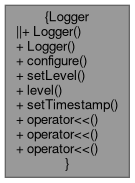A class for logging messages to the console and to files. More...
#include <logger.hpp>

Public Types | |
| enum | Level { CRITICAL = 0 , ERROR = 1 , WARNING = 2 , INFO = 3 , DEBUG = 4 , TRACE = 5 , MAX = 6 } |
| The different levels of logging. More... | |
Public Member Functions | |
| Logger () | |
| Construct a new Logger object. More... | |
| Logger (const std::filesystem::path &path) | |
| Construct a new Logger object and open 5 different files for logging. If the files exist, they will be overwritten. More... | |
| void | configure (const std::filesystem::path &path) |
| Open 5 different files for logging. If the files exist, they will be overwritten. More... | |
| void | setLevel (Level level) |
| Set the minimum level of messages to log to the console. More... | |
| Level | level () const |
| Return the minimum level of messages to log to the console. More... | |
| void | setTimestamp (bool enabled) |
| Enable or disable timestamps. More... | |
| Logger & | operator<< (Level level) |
| Set the message level. More... | |
| Logger & | operator<< (std::ostream &(*manipulator)(std::ostream &)) |
| Transfer a manipulator to the stringstream buffer waiting to be flushed. If the manipulator is std::endl, the buffer will be flushed. More... | |
| template<typename T > | |
| Logger & | operator<< (T const &arg) |
| Transfer a argument to the stringstream buffer waiting to be flushed. More... | |
Detailed Description
A class for logging messages to the console and to files.
Member Enumeration Documentation
◆ Level
| enum Logger::Level |
Constructor & Destructor Documentation
◆ Logger() [1/2]
| Logger::Logger | ( | ) |
Construct a new Logger object.
◆ Logger() [2/2]
| Logger::Logger | ( | const std::filesystem::path & | path | ) |
Construct a new Logger object and open 5 different files for logging. If the files exist, they will be overwritten.
- Parameters
-
path The path to the log files.
- Exceptions
-
std::runtime_error if a log file could not be opened.
Member Function Documentation
◆ configure()
| void Logger::configure | ( | const std::filesystem::path & | path | ) |
Open 5 different files for logging. If the files exist, they will be overwritten.
- Parameters
-
path The path to the log files.
- Exceptions
-
std::runtime_error if a log file could not be opened.
◆ level()
| Logger::Level Logger::level | ( | ) | const |
Return the minimum level of messages to log to the console.
◆ operator<<() [1/3]
Set the message level.
- Parameters
-
level The level to set.
- Exceptions
-
std::runtime_error if a message is currently being logged.
◆ operator<<() [2/3]
| Logger & Logger::operator<< | ( | std::ostream &(*)(std::ostream &) | manipulator | ) |
Transfer a manipulator to the stringstream buffer waiting to be flushed. If the manipulator is std::endl, the buffer will be flushed.
- Parameters
-
manipulator The manipulator to transfer.
◆ operator<<() [3/3]
|
inline |
Transfer a argument to the stringstream buffer waiting to be flushed.
- Parameters
-
arg The argument to transfer.
◆ setLevel()
| void Logger::setLevel | ( | Level | level | ) |
Set the minimum level of messages to log to the console.
- Parameters
-
level The level to set.
◆ setTimestamp()
| void Logger::setTimestamp | ( | bool | enabled | ) |
Enable or disable timestamps.
- Parameters
-
enabled Whether or not to enable timestamps.
The documentation for this class was generated from the following files:
- src/utils/logger.hpp
- src/utils/logger.cpp